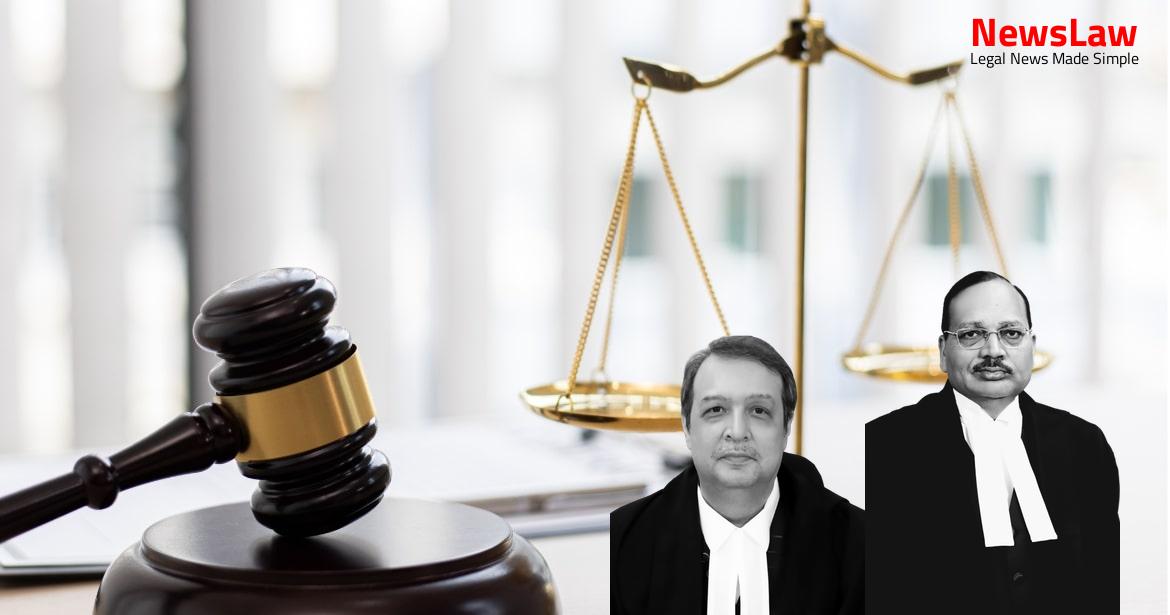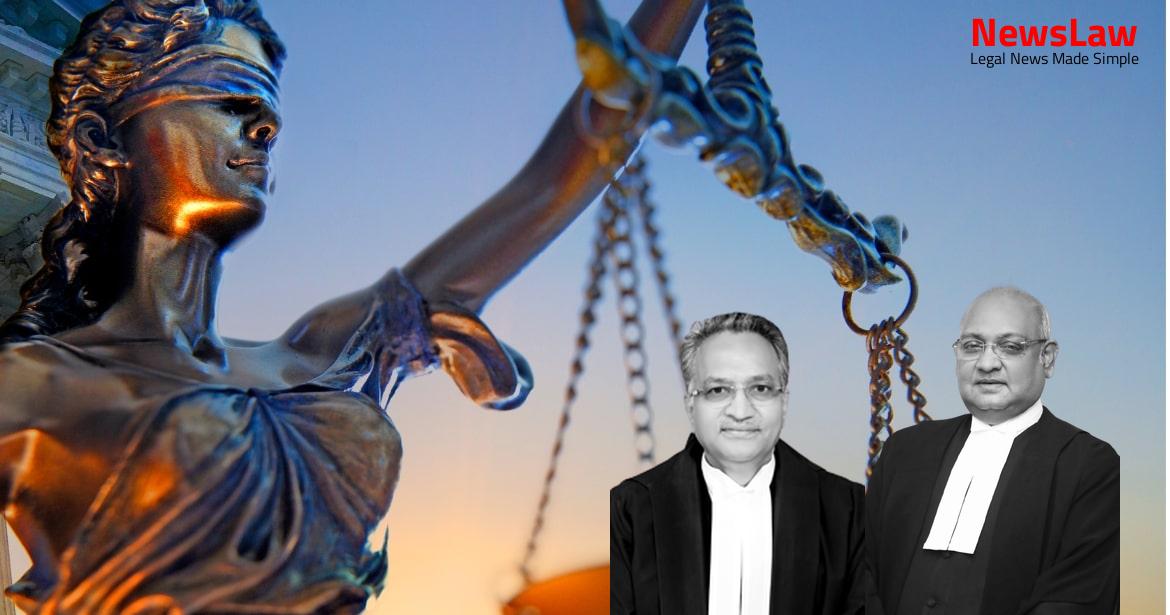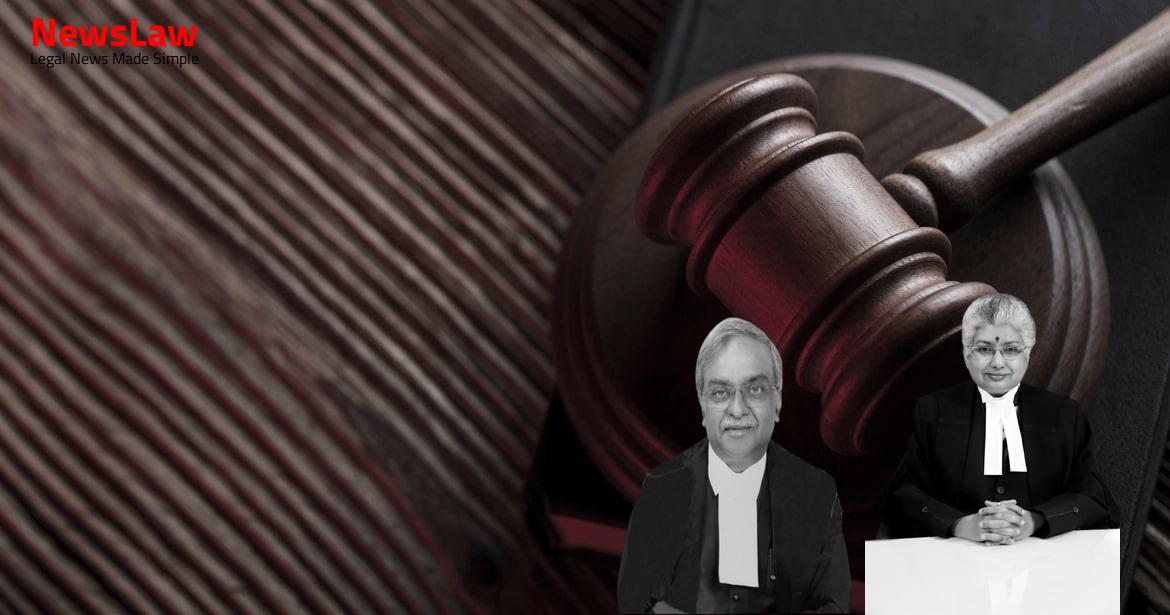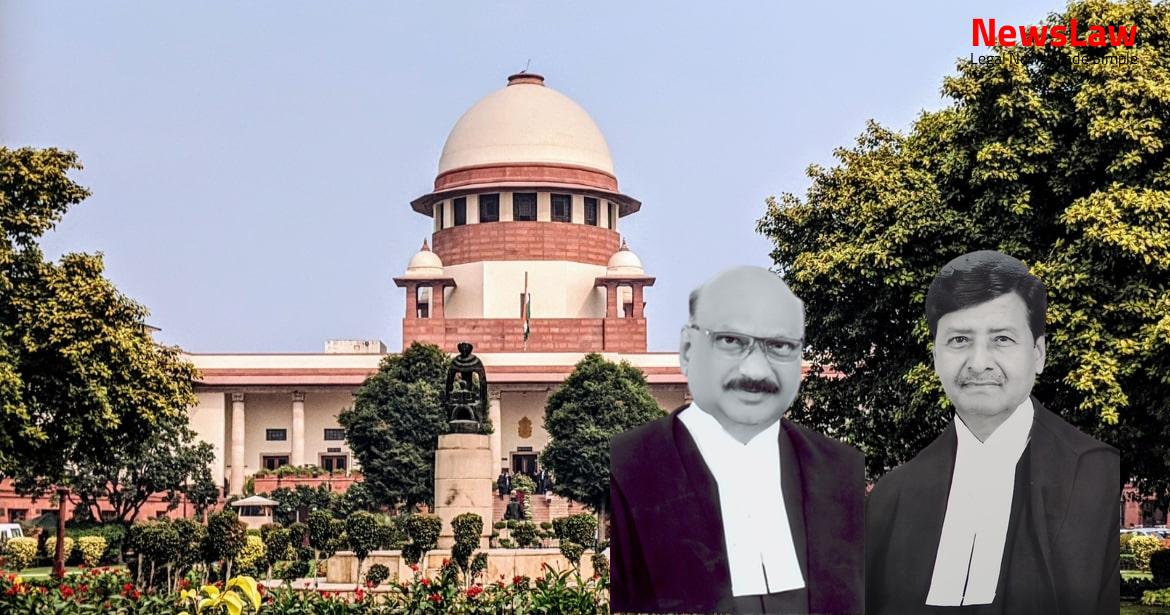Explore the in-depth legal analysis undertaken by the court in a recent case revolving around vicarious liability in cheque dishonour matters. The case delves into the application of Sections 138 and 141 of the Negotiable Instruments Act, shedding light on the statutory provisions governing corporate responsibility. The court’s scrutiny on the nuances of vicarious liability provides valuable insights into legal principles for both practitioners and legal enthusiasts.
Facts
- The accused No.2, on behalf of the firm and with the consent and knowledge of accused No.3, issued a cheque drawn on the Tamilnad Mercantile Bank Ltd., Thiruvanmiyur Branch, Chennai-41.
- The High Court allowed the application filed by the respondent and terminated the proceedings as far as the respondent is concerned.
- The appellant is the original complainant of a complaint filed under Section 138 of the Negotiable Instruments Act, 1881.
- The appellant seeks to recover an amount of Rs. 10,71,434.60 from the partnership firm engaged in the business of milk and milk products.
- The firm issued a cheque in favor of the appellant for Rs. 10,00,000 which was dishonored due to insufficient balance in the account maintained by the firm.
- The accounts of the firm were settled on 13-02-2017 following the dissolution.
- The High Court emphasized that for a complaint to be prosecuted under Section 141 of the NI Act against a partner of a firm, the allegations in the complaint must fulfill the requirements of the said section.
- Merely reciting the words from Section 141 in the complaint does not automatically establish vicarious liability on the partner of the firm.
- The High Court quashed proceedings against the respondent as there was no indication of how the respondent, at the relevant time, was in charge and responsible for the conduct of the business of the firm.
Issue
- The main issue for consideration is whether the High Court made any error in the order it passed.
Arguments
- The counsel for the petitioner argued that the respondent failed to reply to the notice, which could have clarified her role as a sleeping partner.
- The counsel emphasized that specific averments were made in the complaint regarding the active involvement of the partners, including the respondent, in the day-to-day business of the firm.
- Referring to the case of SMS Pharmaceuticals Ltd. v. Neeta Bhalla, the counsel stated that once necessary averments are made, the onus is on the accused to provide evidence contrary to their involvement.
- It was argued that the respondent could have clarified in her reply if the firm was dissolved before the issuance of the cheque, thereby absolving her of liability.
- The counsel contended that the High Court erred in quashing the proceedings against the respondent, as the complaint should have been allowed to proceed.
- A hyper-technical approach in quashing the complaint was criticized, and it was highlighted that the allegation of the cheque issuance was made with the knowledge and consent of the respondent, as per the complaint.
- The counsel stressed that if the complaint meets the requirements of Section 141 of the NI Act, it should proceed to trial.
- The complainant maintains true and correct accounts.
- The accused have to pay a balance of Rs. 10,71,434 to the complainant.
- The complainant produced relevant documents relating to the offense.
- The Manager of the complainant is authorized to represent the firm in this case.
- The respondent’s counsel cited cases to support their submissions.
- The complainant is in the business of Milk and Milk Products.
- The complaint was filed within the stipulated time after the notice period.
- The cheque was presented for collection through HDFC Bank Ltd.
- The court has jurisdiction over the offense as per location.
- The issue regarding the accused’s responsibility for the firm’s affairs requires more details in the complaint.
- An excerpt from the complaint is provided to address a specific issue raised by the petitioner.
- The accused used to purchase Milk and Milk Products on credit from the complainant.
- The first issue raised by the petitioner is deemed a factual matter for trial.
- The second issue concerns the compliance with Section 141 of the Negotiable Instruments Act.
Also Read: Supreme Court Judgment:
Supreme Court Upholds Benefit of Input Tax Credit in Uttar Pradesh Value Added Tax Act 2008
Analysis
- The High Court at that stage does not conduct a mini trial or roving inquiry, but nothing prevents it from taking unimpeachable evidence or totally acceptable circumstances into account which may lead it to conclude that no trial is necessary qua a particular Director.
- The principles of law as laid in Gunmala Sales Private Limited still hold the field and reflect the correct position of the law.
- Specific averments in the complaint and the statutory notice were found regarding the issuance of the cheque with the consent of the respondent and within her knowledge.
- The essential requirement is to make specific averments in the complaint to make the accused vicariously liable.
- Quashing of a complaint is a serious matter and cannot be done merely on the asking.
- Legal proceedings cannot be quashed without showing that no offence is made out against the Director or Partner.
- The burden of alleging and proving consent, connivance, or neglect on the part of any director rests upon the complainant.
- The offence under Section 138 of the Act is completed only with the concatenation of a number of acts.
- No fixed formulae need to be followed by the High Court, and each case requires a different exercise of power to quash.
- The burden is on the Board of Directors or officers in charge of the affairs of the company/partners of a firm to show they were not liable to be convicted.
- If a Director or Partner wants the judicial process quashed, they must provide solid material or circumstances to substantiate their contention.
- Section 138 of the Negotiable Instruments Act deals with the dishonour of a cheque due to insufficient funds in the account.
- Section 141 of the Act states that if a company commits an offence under Section 138, every person in charge of the company at the time of the offence shall be deemed guilty and liable to be proceeded against and punished.
- However, the first proviso of Section 141 provides an exception where a person can escape punishment if they prove that the offence was committed without their knowledge or despite their due diligence.
- The complainant is only required to know who was in charge of the company at the time of the offence.
- The offence of dishonouring a cheque involves multiple steps such as drawing the cheque, presenting it to the bank, giving notice to the drawer, and the drawer failing to make payment within 15 days.
- Persons covered under Section 141(1) and (2) can be proceeded against and punished if they are found responsible for the offence, with the possibility of escaping punishment if certain conditions are met.
- Section 141(2) holds individuals like directors, managers, and officers of the company accountable if the offence was committed with their consent, connivance, or neglect.
- The phrase ‘as well as’ in sub-section (1) of Section 141 of the NI Act extends liability to persons in-charge of the company on par with the company itself.
- When a company is the drawee of a cheque, the company is the principal offender as per legal fiction.
- The court should interpret legal fiction in a way that responsible individuals cannot escape liability by claiming they were not in charge at the time the offence occurred.
- Legal principles dictate vicarious liability can be imposed on those in-charge and responsible for the company’s business affairs.
- Section 141 deems every person in-charge of the company at the time of the offence, liable to be proceeded against and punished.
- Sections 138 and 141 create a statutory presumption of dishonesty, criminalizing cheque dishonour if payment isn’t made within the specified period.
- The court clarified that even honorary or nominated chairmen may be held liable if they were in charge of the company’s affairs at the time of the offence.
- Interpreting a complaint liberally in favor of the complainant and considering the substance of allegations is essential for proceeding with a Section 138 case.
- Legal fiction under Section 141 extends liability to individuals responsible for the company’s conduct, even if they did not personally commit the offence.
Decision
- The principle laid down in Section 141 of the NI Act is susceptible to abuse by unscrupulous companies to the detriment of unsuspecting third parties.
- The appeal was allowed with no order as to costs, quashing the proceedings in STC No 583 of 2017.
- A notice was issued to pay Rs.10,00,000 under a cheque, warning of legal action under section 138 of the Negotiable Instruments Act 1881.
- The prayer includes taking the case on file, issuing summons to the accused, inquiring the matter, punishing the accused with maximum sentence, directing the accused to pay compensation to the complainant under section 357 CPC, and rendering justice.
- The complaint identifies Accused No. 1 as a Partnership Firm, with Accused Nos. 2 and 3 as partners in charge of the day-to-day affairs, regularly involved in the firm’s business.
Case Title: S.P. MANI AND MOHAN DAIRY Vs. DR. SNEHALATHA ELANGOVAN (2022 INSC 970)
Case Number: Crl.A. No.-001586-001586 / 2022



